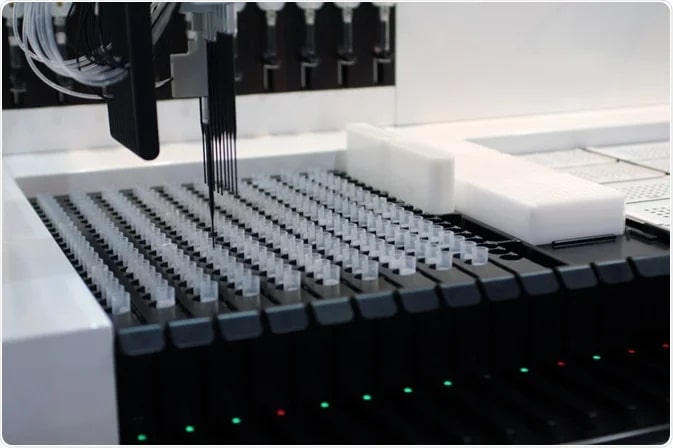
What Does a Liquid Handler Do?
Introduction
In the world of laboratory automation, liquid handlers play a vital role. These sophisticated instruments streamline and expedite various tasks, revolutionizing scientific research and analysis. This article explores liquid handlers’ functions, applications, and advantages, along with an overview of different types and future trends in this cutting-edge technology.
What is a Liquid Handler?
A liquid handler, an automated liquid handling system, is a robotic device utilized in laboratories to precisely dispense, transfer, and manage small volumes of liquid samples. These instruments enable scientists to automate repetitive tasks, reducing human errors and enhancing efficiency. Liquid handlers come equipped with advanced features, such as high-precision pipetting, multi-channel dispensing, and customizable programming, making them an indispensable tool in modern laboratories.
How Does a Liquid Handler Work?
Liquid handlers operate on the principles of air displacement or positive displacement. Air displacement systems use air to aspirate and dispense liquids, which is ideal for handling non-viscous samples. Positive displacement systems, on the other hand, rely on disposable tips to directly contact the liquid, suitable for handling viscous or volatile substances. The automation software allows scientists to program the liquid handler with specific protocols, ensuring accurate and reproducible results.
Applications of Liquid Handlers
Liquid handlers find applications in various scientific fields, including:
H1: Genomics and Proteomics
Liquid handlers are crucial in high-throughput DNA sequencing, PCR setup, gene expression analysis, and protein purification.
H2: Drug Discovery
In pharmaceutical research, liquid handlers expedite drug screening, hit confirmation, and compound management processes.
H2: Clinical Diagnostics
Automated liquid handling systems facilitate clinical testing, sample preparation, and assay development, improving diagnostic accuracy and efficiency.
H3: Next-Generation Sequencing (NGS)
NGS library preparation, a complex process, benefits significantly from the precision and accuracy of liquid handlers.
H3: High-Throughput Screening (HTS)
HTS campaigns, essential in identifying potential drug candidates, are made more efficient with liquid handling automation.
Advantages of Liquid Handlers
Using liquid handlers in laboratories offers several advantages:
H1: Increased Productivity
Liquid handlers can perform tasks at a much higher rate and with greater accuracy than manual methods, saving valuable time for researchers.
H2: Error Reduction
Automating liquid handling processes minimizes the risk of human errors, ensuring consistent and reliable results.
H2: Sample Conservation
These systems can handle small volumes of liquid, reducing sample wastage and enabling researchers to work with precious or limited materials.
H3: Reproducibility
We automated liquid handling results in highly reproducible experiments, crucial in scientific research and development.
Types of Liquid Handlers
H1: Single-Channel Liquid Handlers
Ideal for applications that require precise and controlled dispensing of individual samples.
H2: Multi-Channel Liquid Handlers
These systems can process multiple samples simultaneously, significantly increasing throughput.
H2: Robotic Liquid Handlers
Equipped with robotic arms, these systems provide enhanced flexibility and efficiency.
H3: Automated Pipetting Systems
Designed for high-throughput liquid handling tasks, they are commonly used in genomics and drug discovery.
Factors to Consider When Choosing a Liquid Handler
H1: Throughput Requirements
Assess the number of samples that must be processed daily to select an appropriate liquid handler with the required throughput.
H2: Liquid Viscosity
Consider the type of liquids you will handle, affecting the choice between air and positive displacement systems.
H2: Precision and Accuracy
For applications demanding high precision and accuracy, opt for liquid handlers with advanced technologies.
H3: Compatibility with Labware
Ensure that the liquid handler is compatible with the labware used in your laboratory for seamless integration.
Maintenance and Troubleshooting
Regular maintenance is crucial to ensure optimal performance and longevity of the liquid handler. Follow manufacturer guidelines for cleaning, calibration, and replacement of consumables. If any issues arise, refer to the troubleshooting guide provided by the manufacturer or seek assistance from their support team.
Liquid Handler Market Overview
The demand for liquid handlers has surged with the increasing adoption of automation in laboratories worldwide. Major players in the market continue to invest in research and development to introduce innovative solutions with advanced capabilities. The market is expected to grow substantially in the coming years due to the escalating need for high-throughput screening and precise liquid handling in various industries.
Future Trends in Liquid Handling Technology
As technology evolves, liquid handlers are likely to witness significant advancements. Some potential future trends include:
H1: Integration with AI and Machine Learning
AI integration could enhance liquid handlers’ ability to optimize protocols, adapt to changing requirements, and self-diagnose potential issues.
H2: Miniaturization
Developments in microfluidics and nanotechnology could lead to smaller, more portable liquid handlers.
H2: Increased Customization
Liquid handlers might become more customizable, allowing researchers to tailor systems to their needs.
Conclusion
In conclusion, liquid handlers have revolutionized laboratory workflows by automating liquid handling processes. These instruments have proven invaluable in genomics, drug discovery, clinical diagnostics, and other applications. Their precision, reproducibility, and efficiency have significantly accelerated scientific research and experimentation.
FAQs
Q1: Are liquid handlers user-friendly?
Modern liquid handlers come with user-friendly interfaces and intuitive software, making them accessible even to non-experts.
Q2: Can liquid handlers handle a wide range of liquid viscosities?
Yes, depending on the type of liquid handler, they can handle both low and high-viscosity liquids.
Q3: What kind of maintenance do liquid handlers require?
Liquid handlers require regular cleaning, calibration, and replacement of consumables to ensure optimal performance.
Q4: Can liquid handlers be integrated into existing laboratory workflows?
Yes, liquid handlers are designed to be compatible with various labware and can be seamlessly integrated into existing workflows.
Q5: How do liquid handlers contribute to research efficiency?
Liquid handlers automate repetitive tasks, reduce errors, and increase throughput, significantly enhancing research efficiency.


